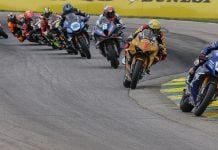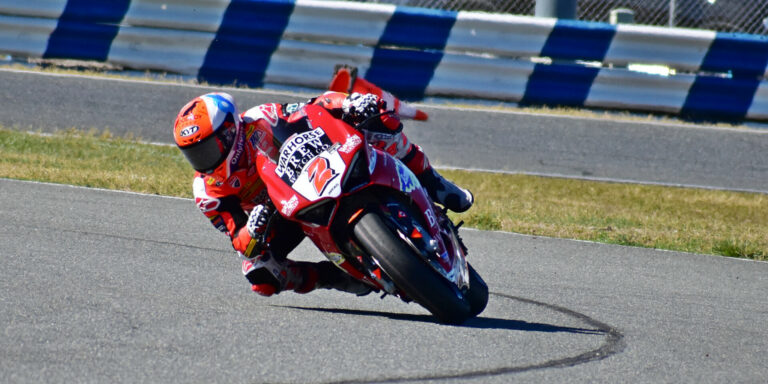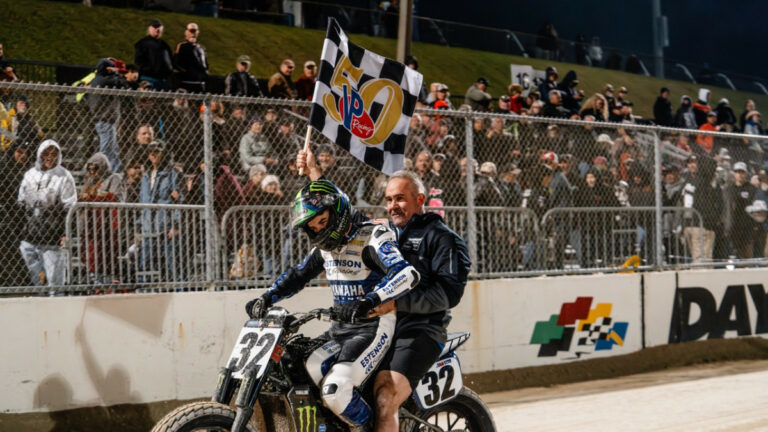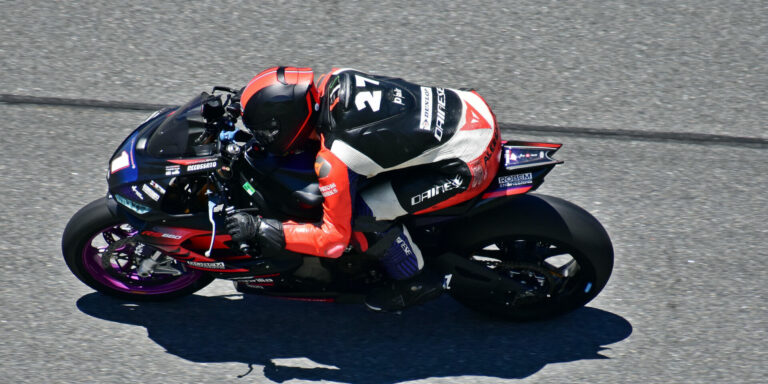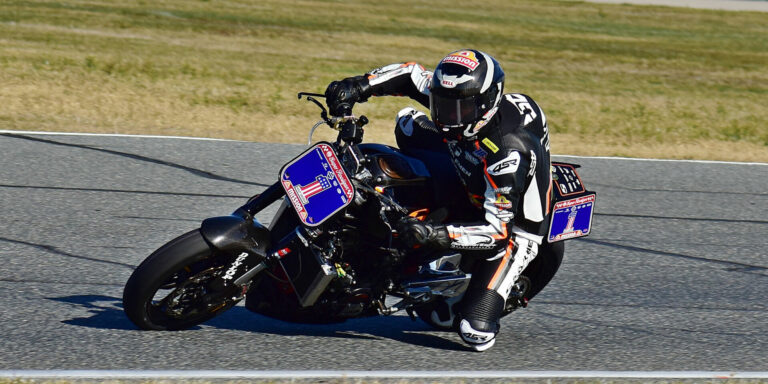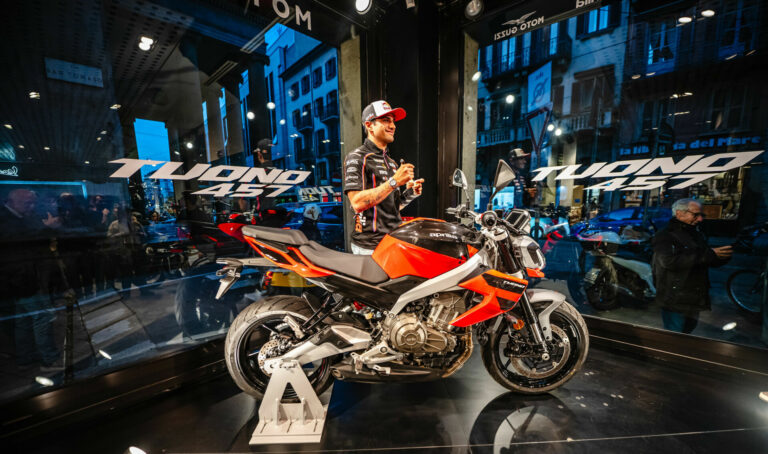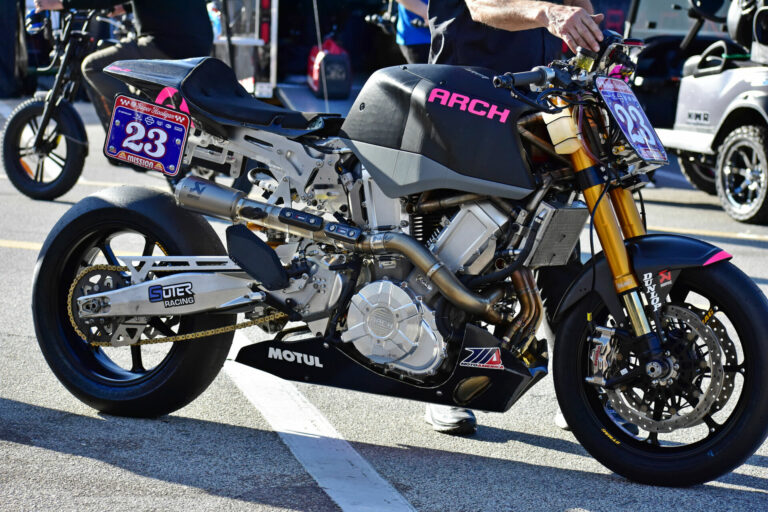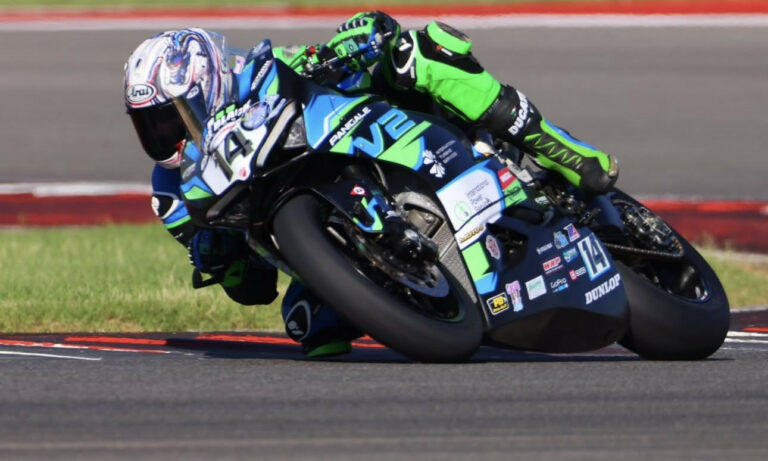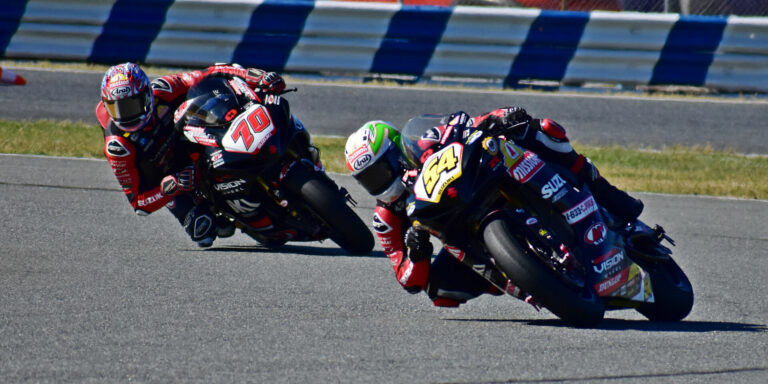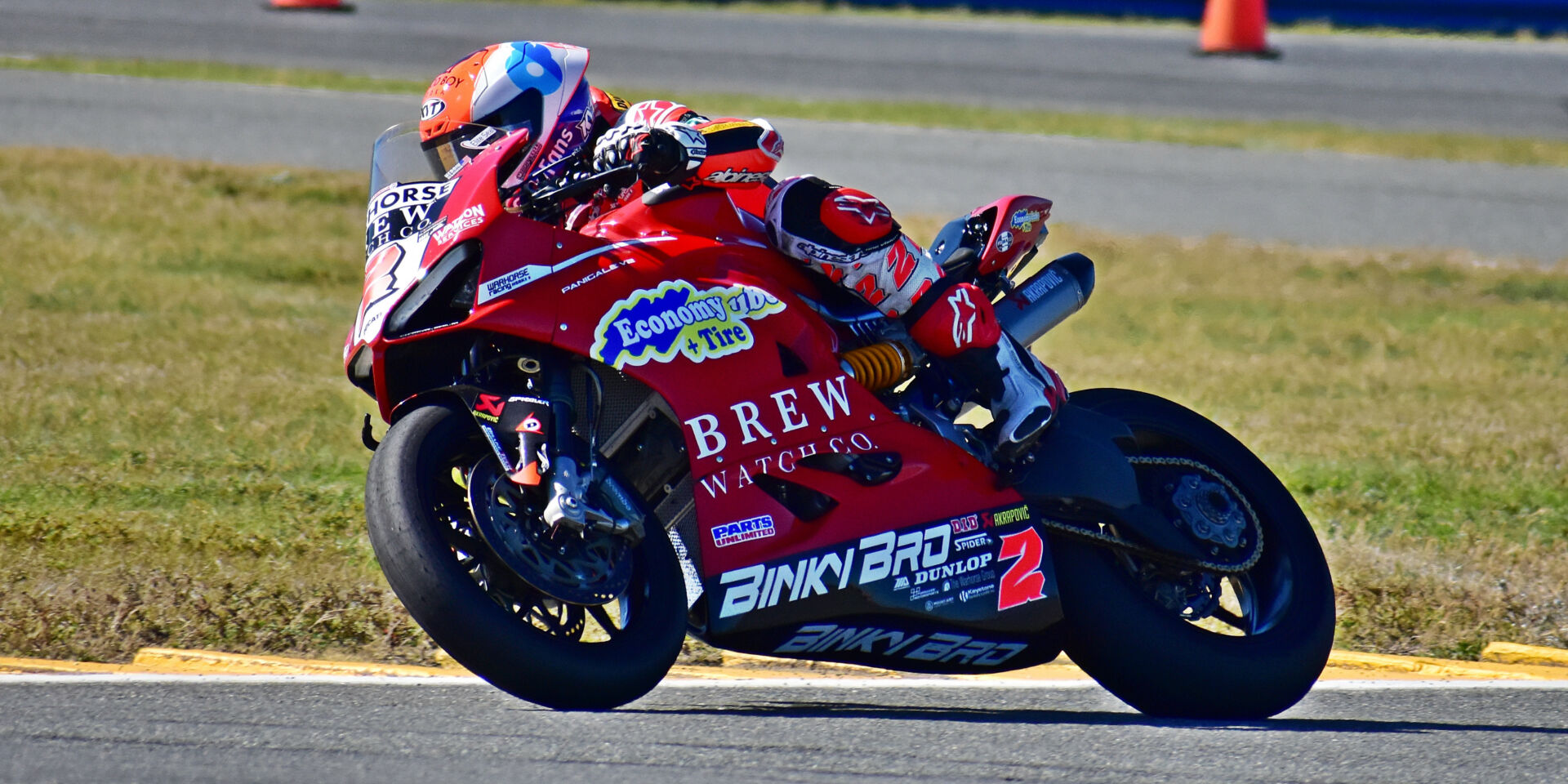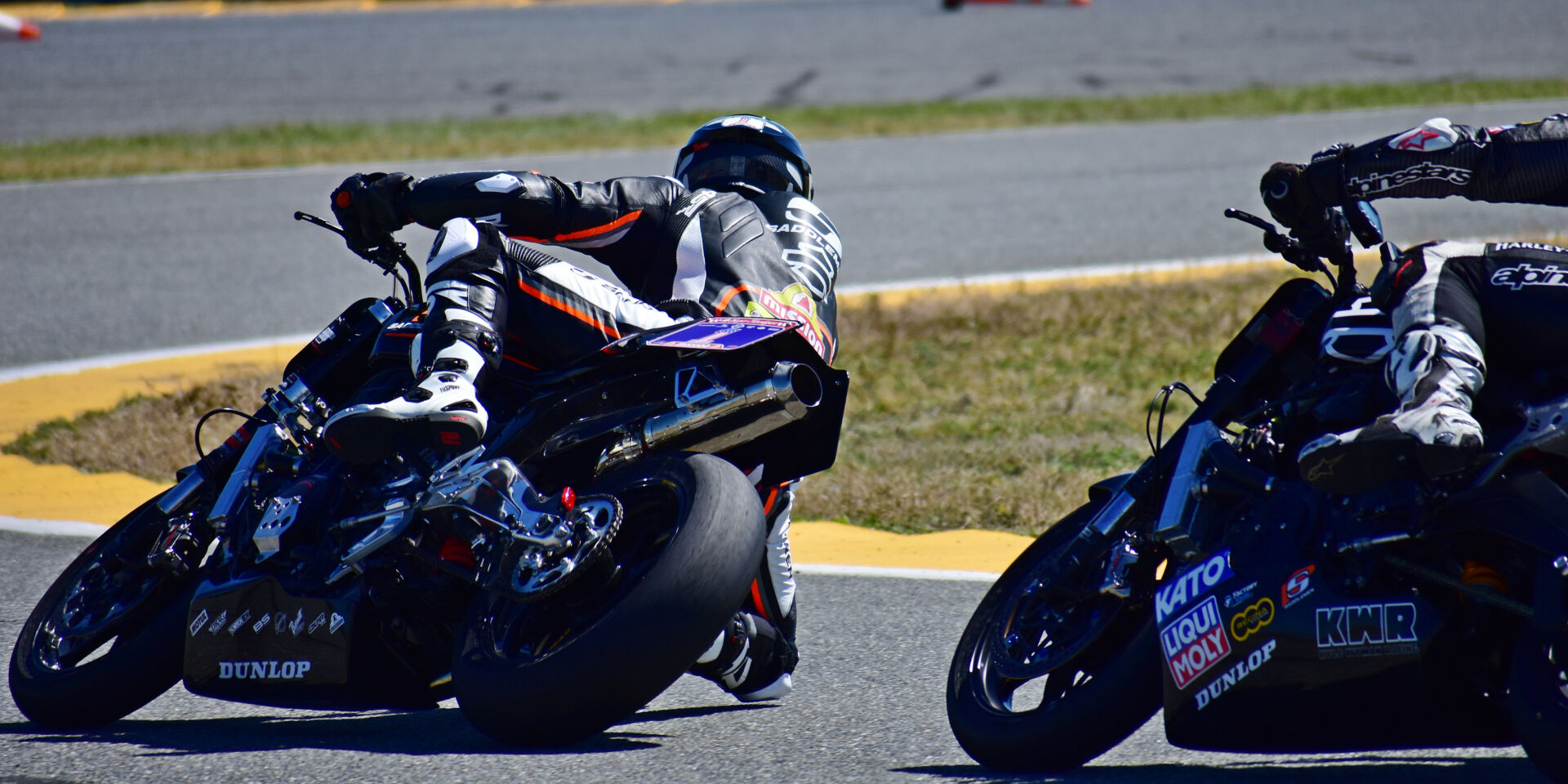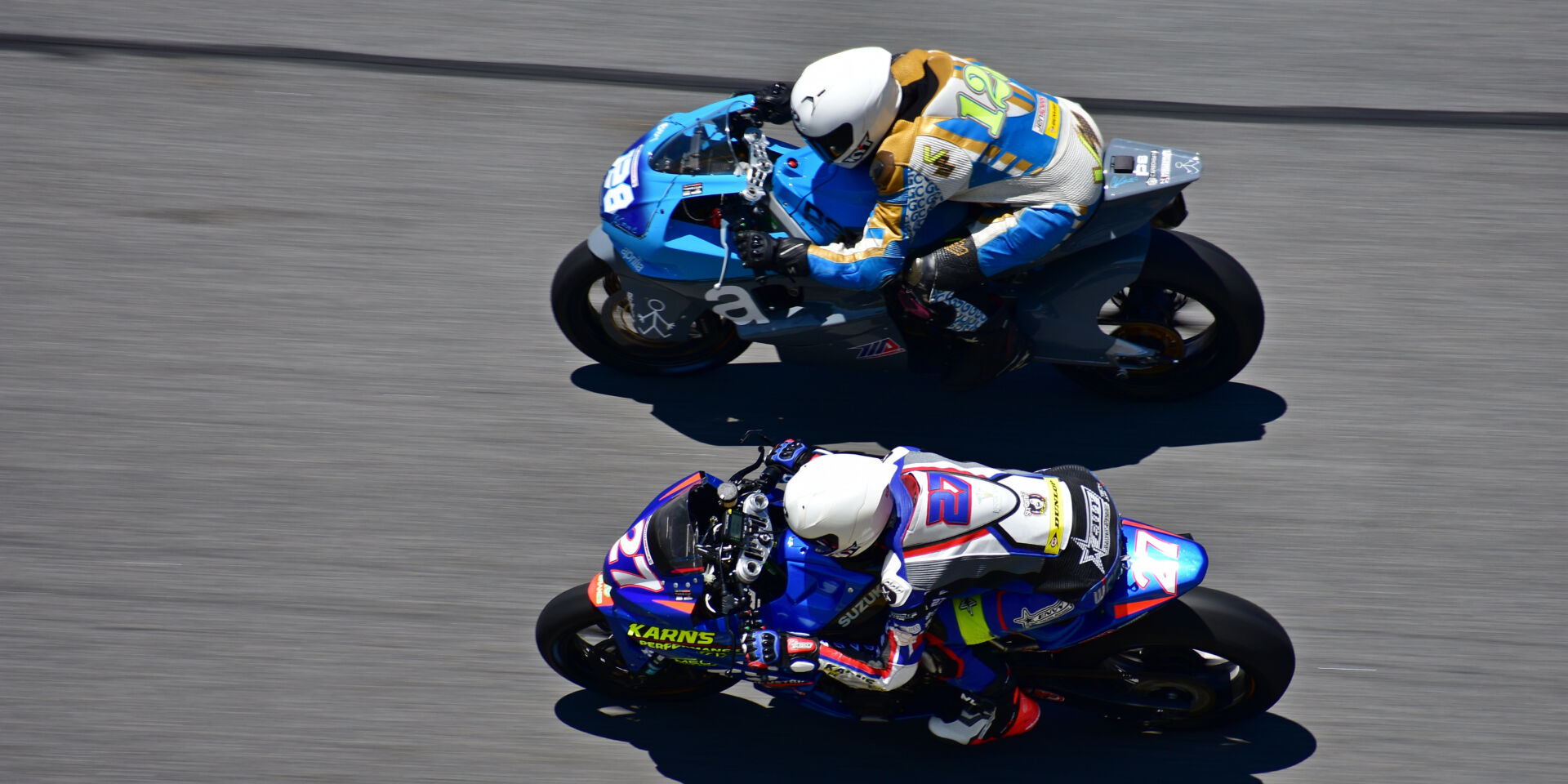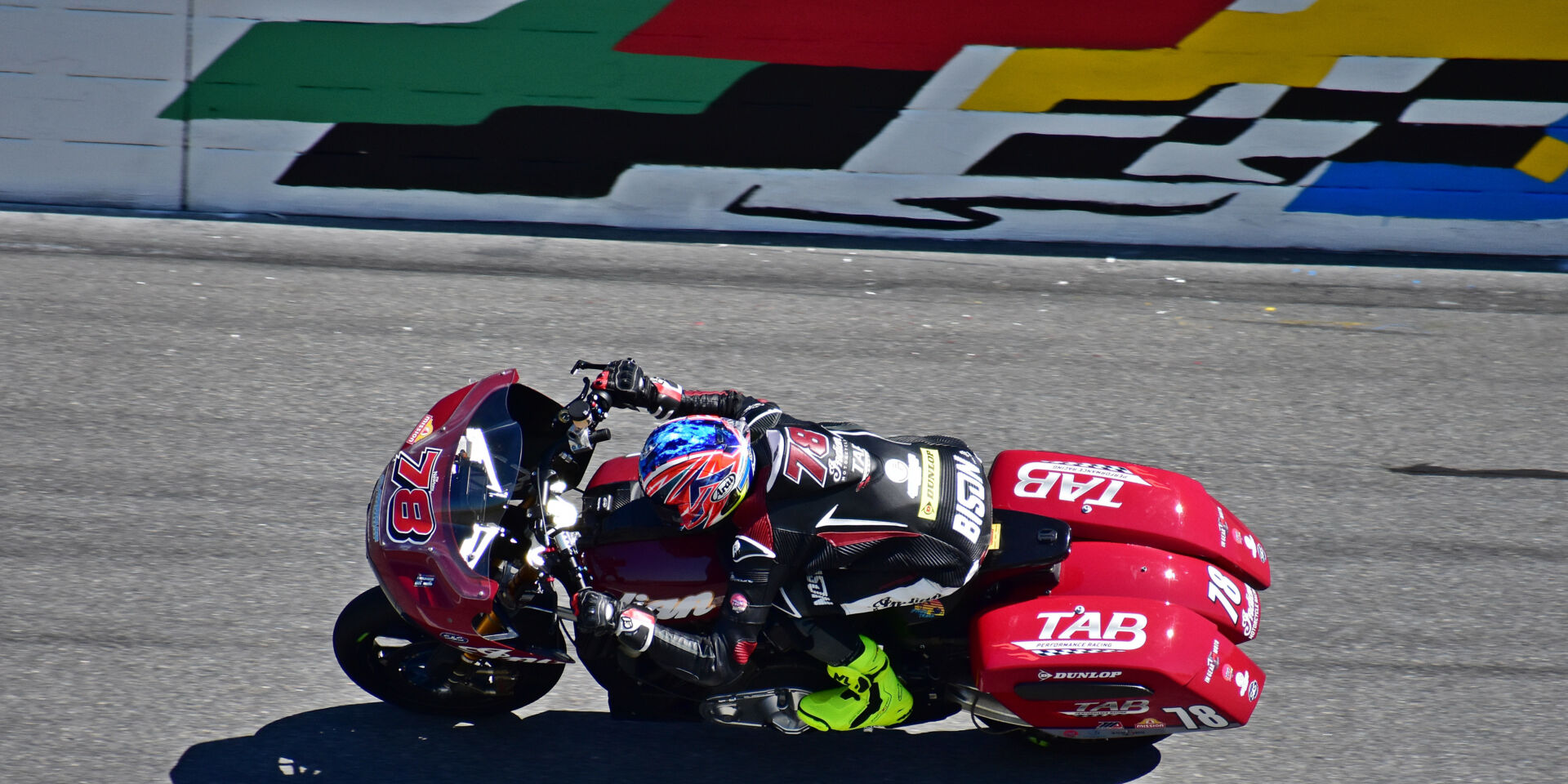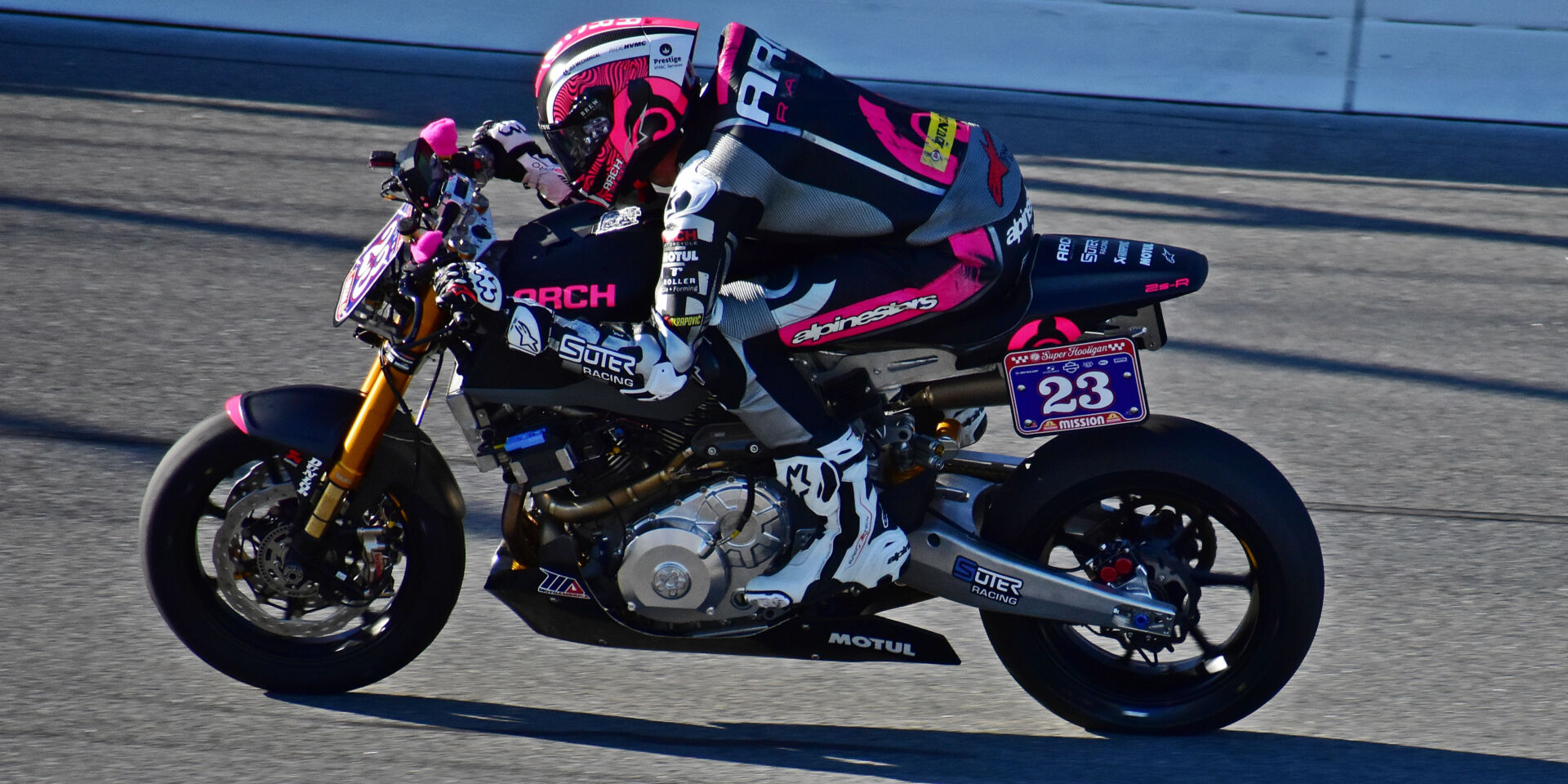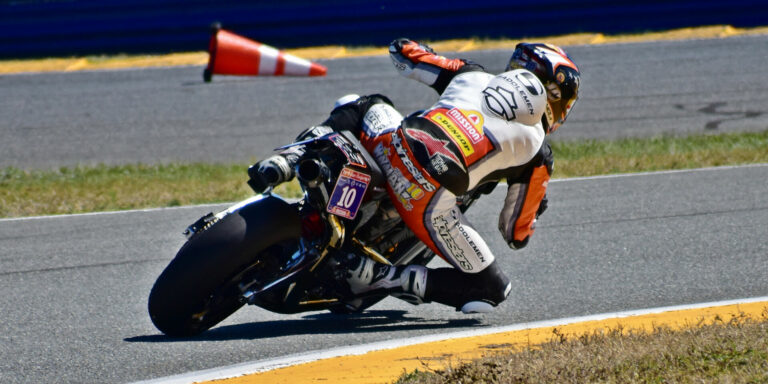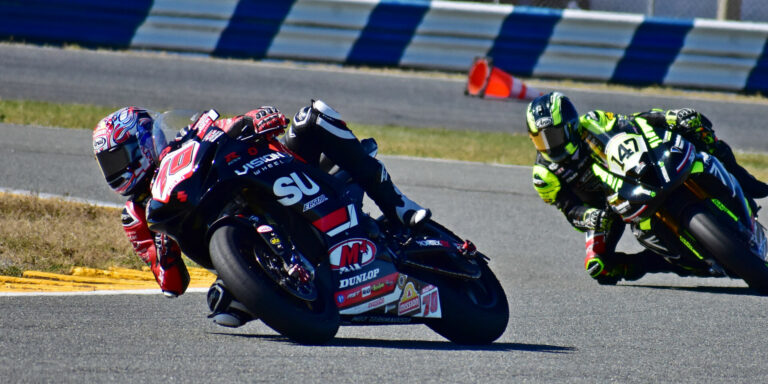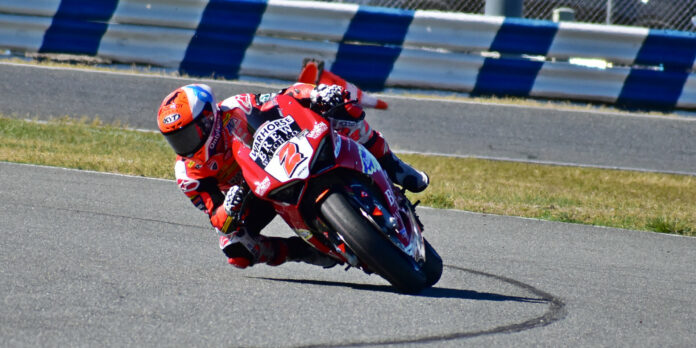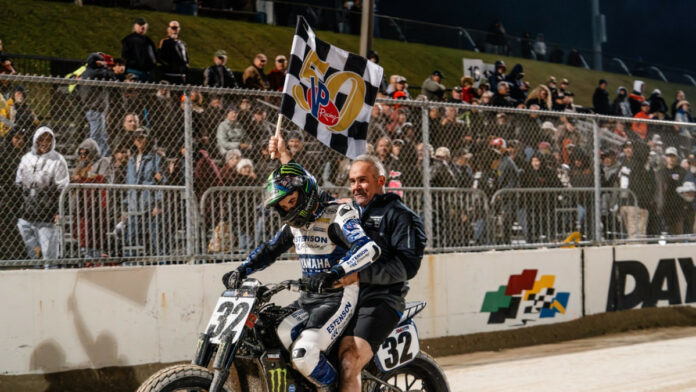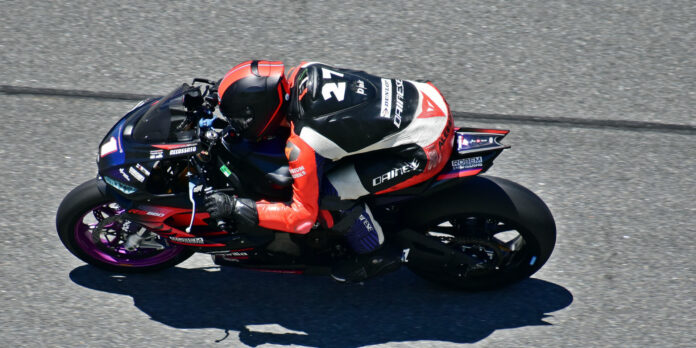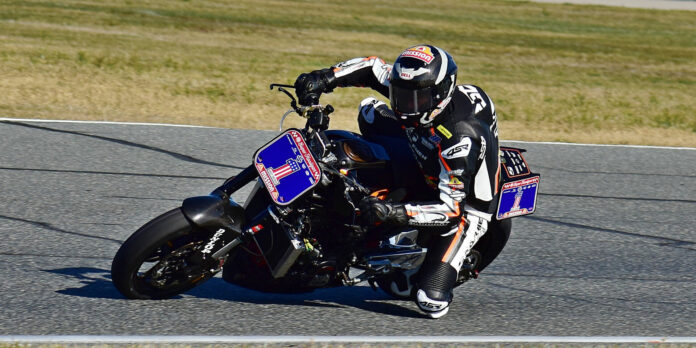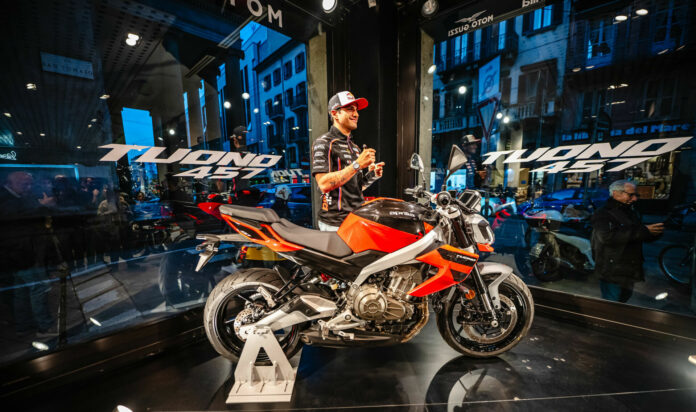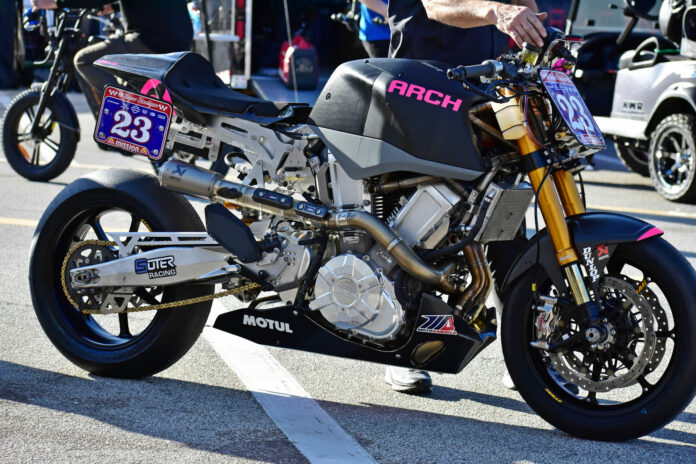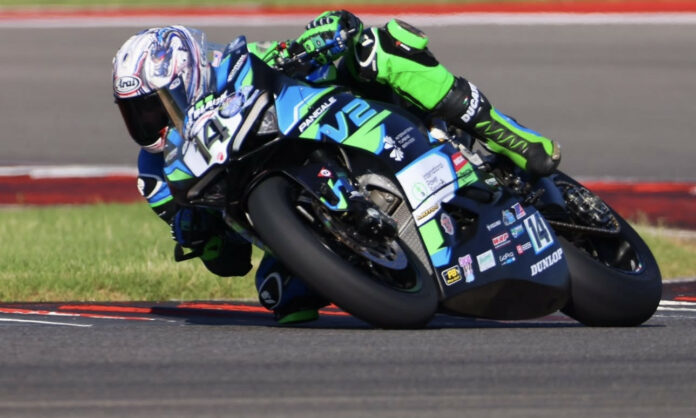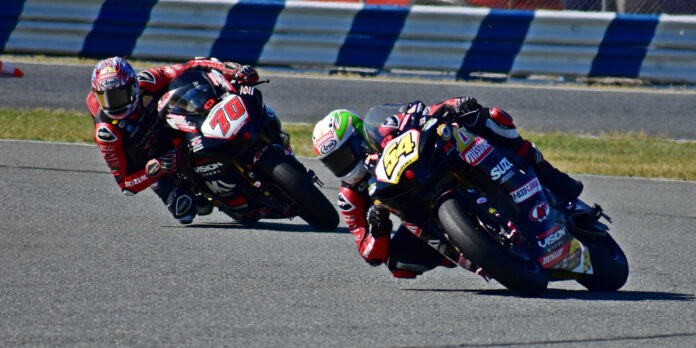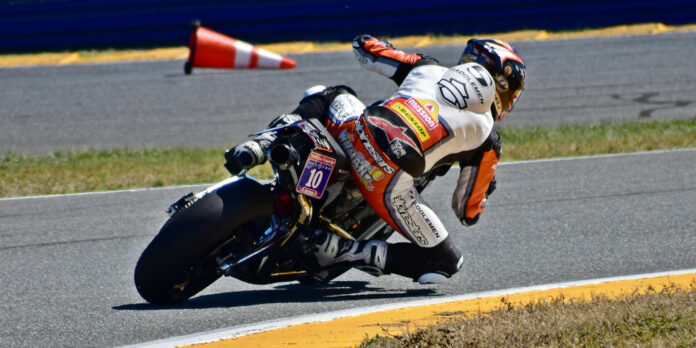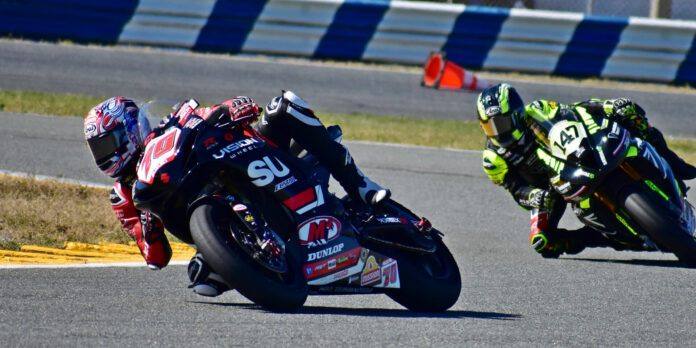DAYTONA BEACH, Fla. (March 6, 2025) – The first Progressive American Flat Track, sanctioned by AMA Pro Racing, round of the post-Jared Mees era saw preseason Mission AFT SuperTwins title favorite Dallas Daniels (No. 32 Estenson Racing Yamaha MT-07 DT) do what many expected and claim victory under the lights of the Flat Track at Daytona International Speedway in Thursday’s season-opening Royal Enfield Short Track at DAYTONA I.
How it was achieved, however, came as a genuine surprise.
In fact, it was anything but a day of domination for Daniels, despite the fact that he’d won three of the previous four Main Events at the venue. If anything, the Estenson Racing ace was relatively quiet throughout practice and qualifying, starting the Main Event from Row 2 after failing to qualify for the Mission #2Fast2Tasty Challenge.
Instead, the star of the show for all but the final minute of the Main Event was Briar Bauman (No. 3 RWR/Parts Plus/Latus Motors Harley-Davidson XG750R), who appeared on the verge of guiding the Harley-Davidson XG750R to its maiden premier-class victory.
New to the bike but reunited with crew chief Dave Zanotti and mechanic Michelle Disalvo at Rick Ware Racing, Bauman was smooth and in control on a very tricky track. He put his name atop the charts during practice, qualifying, and the Mission #2Fast2Tasty Challenge, before storming off into the lead at the start of the Main.
Daniels showed renewed signs of life as soon as the race that mattered most got underway, diving under front-row qualifiers Davis Fisher (No. 67 Rackley Racing/Bob Lanphere’s BMC Racing KTM 790 Duke), Henry Wiles (No. 911 J&M Logging/Ray C’s Harley-Davidson Kawasaki Ninja 650), and Brandon Robinson(No. 44 Mission Roof Systems Harley-Davidson XG750R) in rapid succession to move into second
However, even with clear air in front of him, Daniels didn’t appear to have the measure of Bauman, who stretched the gap out to over a second deep into the contest. That all changed as the two encountered lapped traffic, which allowed the Yamaha pilot to erase the distance and then execute a pass for the lead with just 35 seconds remaining on the clock.
A rare bobble on Bauman’s part then provided Daniels with the breathing space he needed to make it four wins in his last five tries in Daytona Beach.
The victory also marked Daniels first win since before the training accident that ended his title chances a season ago.
He said, “I hate that everybody has to hear my sob story again, ‘I broke my leg leading the championship (last year).’ I mean, it sucked. It sucked so bad. It sucked so bad for me, but even more for the team. It’s one of those things when you’re lying at home, and you wonder if you’ll ever be able to do it again. Even though I was on the podium those last three races, you still wonder.
“And then I show up here at Daytona – a place that I love and do well at usually – and I was just on the struggle bus all day long. No matter what changes we made, I just could not get comfortable. But my team… this win is because of the team. They just kept working and kept working. When I went out there for that warm-up lap, I knew I had something for them. But how impressive was Briar? The dude gets on a different bike that has never won, and he was the toughest competition. He’s going to be tough all year.”
Third place went to 40-year-old Wiles, who was brandishing the unfamiliar #911 instead of his usual #17, which was unavailable to him due to not competing last season. The time away didn’t steal any of his speed or aggression, a fact he proved convincingly while overcoming Fisher in an intense mid-race scrap for the final podium position.
Still, Fisher held on for a strong fourth-place debut on the KTM, while Robinson made it two XGs in the top five.
Brandon Price (No. 92 Memphis Shades/Vinson Construction/OTBR Yamaha MT-07), who finished as the runner-up in last year’s opener, came home sixth. Meanwhile, Jarod VanDerKooi (No. 20 Fastrack Racing/Wally Brown Racing KTM 790 Duke), Trent Lowe (No. 48 American Honda/Progressive Insurance Honda Transalp), Max Whale (No. 18 Moto Anatomy X Powered by Royal Enfield 650), and James Ott (No. 19 G&G Racing Yamaha MT-07) finished seventh through tenth, respectively.
Those results meant that six different makes of equipment (Yamaha, Harley-Davidson, Kawasaki, KTM, Honda, and Royal Enfield) were represented in the top ten in the first race featuring the new all-production based ruleset. A seventh (Suzuki), clocked the second fastest time in practice before a promising event met a premature end for Dan Bromley (No. 62 Memphis Shades/Vinson Construction Suzuki GSX-8S), who was unable to compete after suffering a deep cut that required medical attention.
AFT Singles presented by KICKER
Not that any of them needed it, but three-time AFT Singles presented by KICKER king Kody Kopp (No. 1 Bob Lanphere/KTM/Fastrack Racing KTM 450 SX-F) provided the class’ current crop of championship hopefuls a reminder of exactly whose #1 plate they were chasing.
While Kopp is committed to proving himself a national-caliber roadracer this season, his talents on dirt remain elite. With an open weekend in his preseason pavement prep, Kopp pulled together a last-minute effort to participate in the Progressive AFT opener and didn’t miss a beat.
A less-than-ideal start allowed Kopp to underline that message as he worked his way past the up-and-coming Tarren Santero (No. 75 Mission Roof Systems Honda CRF450R), ‘24 title rival Tom Drane (No. 59 Estenson Racing Yamaha YZ450F), and finally ‘19 class champ Dalton Gauthier (No. 79 D&D Certified Racing KTM 450 SX-F) on his way to the front.
Once there, Kopp set sail en route to his fourth career triumph in Daytona. However, his eventual trip to the top step of the podium was momentarily delayed due to a late-race red flag.
That stoppage could be traced all the way back to a disastrous start saw title hopeful Chase Saathoff (No. 88 RWR/Parts Plus Honda CRF450R) left standing still at the green light with his arms waving while the rest of the grid powered by. His subsequent charge up through the field eventually saw him clash with Chad Cose (No. 49 1st Impressions Race Team Husqvarna FC450), leaving both riders on the ground.
Kopp survived the staggered restart without suffering any unwanted drama, while Drane managed to steal second from Gauthier in the shuffle.
After the race, Kopp said, “It feels awesome. I just can’t stay away from it. I’m transitioning to roadracing, and it’s a big step. It’s challenging, and I’m really excited about the challenge. But I couldn’t stay away. I live 15 minutes away from here now, and Bob Lanphere wanted to put this thing together, and we got it done. Huge thanks to Bob, and Kenny (Roberts) and Arney (Wick) from my roadrace program for giving me the go ahead to do this.”
Fourth was taken by the returning Trevor Brunner (No. 21 American Honda/Mission Foods CRF450R), who edged young Bradon Pfanders (No. 83 Hannum’s HD/Pfanders Racing KTM 450 SX-F) and Santero for the position.
Evan Renshaw (No. 65 1st Impressions Race Team Husqvarna FC450) finished seventh in his first race with 1st Impressions Husqvarna while Saathoff managed to slash his way up to eighth to salvage a decent result after being forced to restart from the back of the grid.
Aidan RoosEvans (No. 26 FRA Trust/ATV’s and More Yamaha YZ450F) and Jared Lowe (No. 63 BigR/Little Debbie Racing Honda CRF450R) rounded out the top ten.
Earlier in the evening, Emma Gottsch (No. 5 Royal Enfield/Parts Unlimited) opened the Main Event program with a victorious performance in her Royal Enfield Build. Train. Race. debut. She was flanked on the podium by Taia Little (No. 11 Royal Enfield/Parts Unlimited) and Mallory McGill (No. 58 Royal Enfield/Parts Unlimited).
Next Up:
The world’s premier dirt track motorcycle racing series will return to the track tomorrow night for the second half of the season-opening Royal Enfield Short Track at DAYTONA doubleheader. Visit https://www.tixr.com/groups/americanflattrack/events/daytona-short-track-ii-119108 to secure your tickets today.
For those that can’t catch the live action from the circuit, FloRacing is the live streaming home of Progressive AFT. Sign up now and catch every second of on-track action starting with Practice & Qualifying and ending with the Victory Podium at the end of the night at https://flosports.link/aft.
FOX Sports coverage of the Royal Enfield Short Track at DAYTONA I, featuring in-depth features and thrilling onboard cameras, will premiere on FS1 on Saturday, March 15, at 12:00 p.m. ET (9:00 a.m. PT), with the Royal Enfield Short Track at DAYTONA II set to air the following day, Sunday, March 16, at 1:00 p.m. ET (10:00 a.m. PT).
For more information on Progressive AFT visit https://www.americanflattrack.com.


